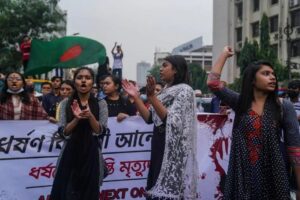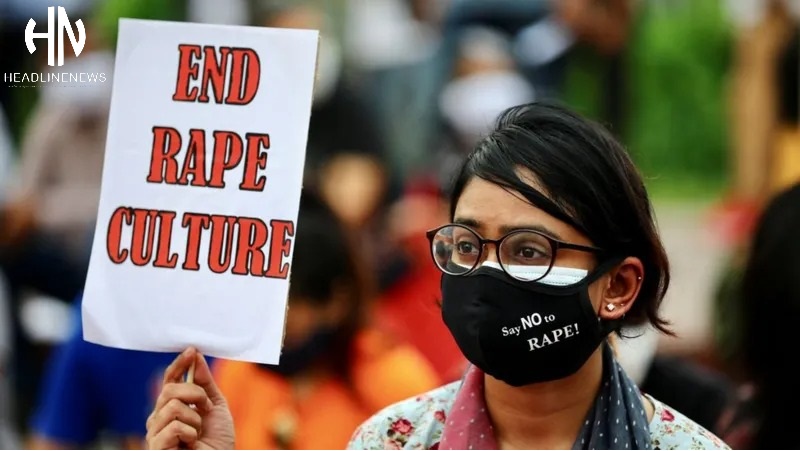Bangladesh Rape Crisis Sparks Global Alarm — Nigerian Women at Risk as Trafficking into Crisis Zones Surges
By HeadlineNews.News Investigative Desk | July 20, 2025
Bangladesh is in the grip of a mounting crisis, with a shocking 24 rape cases reported between June 20 and June 29 alone—many involving minors. The wave of sexual violence has been described as a “pandemic-level emergency” by Sharmeen S. Murshid, senior adviser to the Ministry of Women and Children Affairs.
But the crisis is not confined to Bangladesh’s borders. As the country reels from these abuses, a disturbing pattern of human trafficking involving young Nigerian women into Bangladesh and similar crisis regions is emerging, putting countless lives at risk and prompting urgent calls for Nigerian government intervention.

Rape Crisis in Bangladesh: A Breakdown
In less than 10 days, official records confirm 24 cases of rape across Bangladesh, a staggering figure that has drawn global concern.
Murshid, a 40-year veteran of gender rights advocacy, called the violence “an epidemic of abuse.”
She cited failures in enforcement, a broken cultural system, and unchecked digital exposure among root causes.
“Children now have unrestricted access to harmful digital content. We are seeing a complete breakdown of values,” Murshid said.
One recent case involved a 10-year-old boy assaulting a 2.5-year-old toddler—a horrifying testament to how deeply societal norms have eroded.

Quick-response units have been activated at sub-district (upazila) levels, but the Ministry’s hotline has logged over 281,000 complaints in 11 months, straining limited administrative resources.
Gang-Rape Incident Triggers Nationwide Protest
A particularly heinous gang-rape of a Hindu woman in Cumilla District—allegedly led by local political figure Fazor Ali—has intensified the national reckoning. The incident, recorded and shared online, ignited protests across the country, echoing earlier outrage over the rape and death of an 8-year-old girl earlier this year.
> “We can no longer pretend this is normal,” Murshid declared.
“This is a national crisis—and it demands a national solution.”
Nigerian Women Being Trafficked into Crisis Zones
As Bangladesh battles its epidemic of sexual violence, information reaching HeadlineNews.News confirms that Nigerian young women are being trafficked into the country—knowingly and unknowingly—into some of the world’s most dangerous environments for women.
Weekly, Nigerian girls are being lured into countries like Bangladesh, Iraq, and parts of the Middle East, where:
- Women’s rights are virtually non-existent
- Caste systems and gender-based violence are systemic
- Legal recourse is rare or unavailable

Many of these girls are deceived with promises of jobs, education, or modeling opportunities. Instead, they end up in subhuman conditions worse than slavery, subjected to:
- Sexual exploitation
- Forced prostitution
- Hard labour and domestic servitude
According to anti-trafficking sources, the agents who arrange these trips are part of well-financed criminal networks, often based in Nigeria, who refuse to release the victims due to the financial investment made in “acquiring” them.
“How can a Nigerian agent send innocent girls to a country where rape is officially declared a national emergency?” asked one NGO investigator.
“This is beyond greed—this is calculated destruction of lives.”

A National Duty to Act
This is a wake-up call for the Nigerian government, security agencies, and civil society.
HeadlineNews.News is calling on all Nigerians:
If you have information on trafficked Nigerian girls or the agents involved, report immediately to the National Agency for Prohibition of Trafficking in Persons (NAPTIP) or contact HeadlineNews.News confidentially.
Agents enabling this criminal network must be arrested and prosecuted.
Preventive education must reach communities where these girls are being recruited.
Legal Frameworks vs. Moral Collapse
Bangladesh has harsh laws under its Women and Children Repression Prevention Act, but even the strongest legislation fails without social and institutional support. The same applies in Nigeria.
We must go beyond laws—we need enforcement, naming and shaming of predators, education reform, digital safety, and cultural transformation.
The crisis in Bangladesh is a glimpse of what could fester elsewhere if trafficking is left unchecked. Nigerian girls are being shipped into rape zones. The time to act is now.

Conclusion: This Is Not a Foreign Problem—It’s Ours Too
From Dhaka to Lagos, from Comilla to Kano, the message is clear: women and girls are under siege. But they don’t have to be victims forever. With accountability, government resolve, and public action, this tide can be turned.
> As Murshid put it: “This isn’t just violence. It’s a national collapse—and only a national solution can stop it.”
Roshni Singh.
Headlinenews.news Special Investigative Report, Bangladesh.
#EndRape #StopTrafficking #NigerianWomenMatter #ProtectOurGirls #BangladeshCrisis #NAPTIP #HumanRights #HeadlineNews



